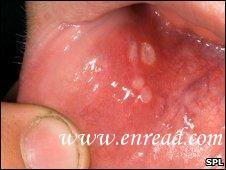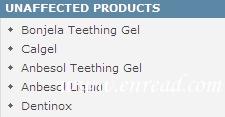Ulcer gels warning for children 儿童慎用某些口腔溃疡药物
(单词翻译:单击)
Mouth ulcer1 and teething treatments containing salicylate salts should not be used by children under the age of 16, UK experts have said.
英国专家称,16岁一下的儿童的口腔溃疡和出牙时期不应该使用含有水杨酸盐的药物进行治疗。
There is a theoretical risk that these products could cause a serious condition called Reye's syndrome3(综合症).
However, the Medicines and Healthcare products Regulatory Agency (MRSA) said the advice was precautionary(预防的,留心的), as no cases had been recorded.
The main products affected4 are Bonjela and Bonjela Cool Mint Gel.
Salicylate salts have the same effect on the body as aspirin5, which experts have already warned should not be used by children.
The MHRA has received reports of three children being hospitalised after using oral gels containing choline salicylate(胆碱水杨酸盐).
However, Reye's syndrome was not confirmed in any of the cases.
In a further four cases children experienced vomiting6(呕吐) or diarrhoea(腹泻) after using Bonjela for teething pain, but all made a full recovery.
The MHRA stressed there were a number of alternative treatments for pain associated with teething and mouth ulcers.
It advised parents to seek advice from a GP, dentist or pharmacist(药剂师) if unsure what to do.
Dr June Raine, MHRA director of vigilance(警戒,守夜) and risk management of medicines, said the new advice brings these products into line with others containing aspirin.
She said: "Any risk from these oral gel products is theoretical. We are not aware of any confirmed cases, but when there are alternatives available, any risk is not worth taking."
Remote risk
David Pruce, of the Royal Pharmaceutical7 Society of Great Britain (RPSGB) stressed the risk was purely8 theoretical.
"There is a very remote risk for young children using this product and it is always best to err9(犯错,做错) on the side of caution.
"There are other products on the market which have the same soothing10(安慰的) effect, but which do not contain salicylate salts and are therefore safe to use on children younger than 16."
Reye's syndrome(雷伊氏综合症) is a rare but potentially fatal disease that causes damage to many of the body's organs.
In particular it causes swelling11(膨胀) of the brain, and problems with fat in the liver.
The initial symptoms(症候) include persistent12 vomiting, listlessness(不留心,无精打采的), loss of energy, and drowsiness13(睡意).
Without treatment this can progress to extreme irritability14(过敏性,兴奋性), agitation15(激动,兴奋), delirium16(精神错乱,热狂), and coma17(昏迷).
Most children who have developed Reye's syndrome were recovering from a viral infection(病毒性感染), usually either flu or chickenpox(水痘), and had taken aspirin to treat their symptoms.
A statement from Reckitt Benckiser, which makes Bonjela, said it had redesigned packaging to make it easier for consumers to choose the right gel.
Bonjela is designed to relieve the pain and swelling caused by mouth ulcers, denture(假牙) sores and brace18 sores.
Bonjela Cool does the same thing but is formulated19 as a cool mint gel.
Bonjela Teething Gel for young children contains a different formula and is unaffected.
 收听单词发音
收听单词发音
1
ulcer

|
|
| n.溃疡,腐坏物 | |
参考例句: |
|
|
|
2
ulcers

|
|
| n.溃疡( ulcer的名词复数 );腐烂物;道德败坏;腐败 | |
参考例句: |
|
|
|
3
syndrome

|
|
| n.综合病症;并存特性 | |
参考例句: |
|
|
|
4
affected

|
|
| adj.不自然的,假装的 | |
参考例句: |
|
|
|
5
aspirin

|
|
| n.阿司匹林 | |
参考例句: |
|
|
|
6
vomiting

|
|
| 吐 | |
参考例句: |
|
|
|
7
pharmaceutical

|
|
| adj.药学的,药物的;药用的,药剂师的 | |
参考例句: |
|
|
|
8
purely

|
|
| adv.纯粹地,完全地 | |
参考例句: |
|
|
|
9
err

|
|
| vi.犯错误,出差错 | |
参考例句: |
|
|
|
10
soothing

|
|
| adj.慰藉的;使人宽心的;镇静的 | |
参考例句: |
|
|
|
11
swelling

|
|
| n.肿胀 | |
参考例句: |
|
|
|
12
persistent

|
|
| adj.坚持不懈的,执意的;持续的 | |
参考例句: |
|
|
|
13
drowsiness

|
|
| n.睡意;嗜睡 | |
参考例句: |
|
|
|
14
irritability

|
|
| n.易怒 | |
参考例句: |
|
|
|
15
agitation

|
|
| n.搅动;搅拌;鼓动,煽动 | |
参考例句: |
|
|
|
16
delirium

|
|
| n. 神智昏迷,说胡话;极度兴奋 | |
参考例句: |
|
|
|
17
coma

|
|
| n.昏迷,昏迷状态 | |
参考例句: |
|
|
|
18
brace

|
|
| n. 支柱,曲柄,大括号; v. 绷紧,顶住,(为困难或坏事)做准备 | |
参考例句: |
|
|
|
19
formulated

|
|
| v.构想出( formulate的过去式和过去分词 );规划;确切地阐述;用公式表示 | |
参考例句: |
|
|
|
- 上一篇:Sugary drinks 'worsen vomit bug' 含糖饮料“加重呕吐”
- 下一篇:Cow genome 'to transform farming' 重组牛基因可“改进农业生产”






